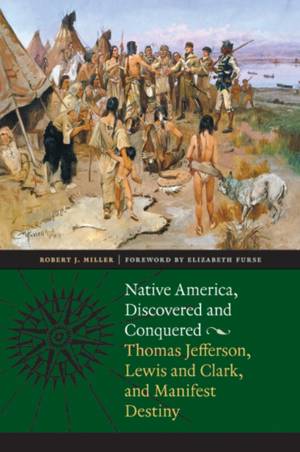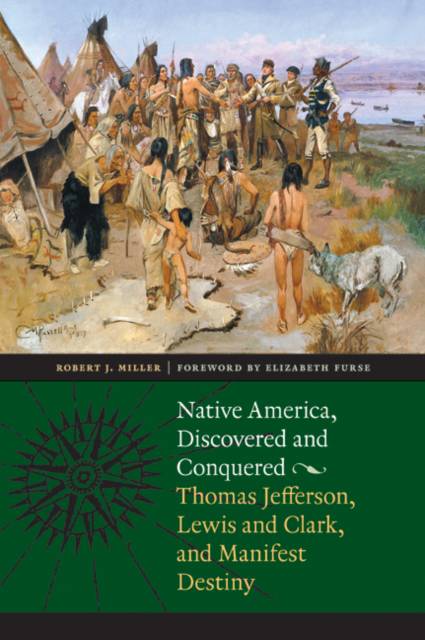
- Afhalen na 1 uur in een winkel met voorraad
- Gratis thuislevering in België vanaf € 30
- Ruim aanbod met 7 miljoen producten
- Afhalen na 1 uur in een winkel met voorraad
- Gratis thuislevering in België vanaf € 30
- Ruim aanbod met 7 miljoen producten
Zoeken
Native America, Discovered and Conquered
Thomas Jefferson, Lewis & Clark, and Manifest Destiny
Robert J Miller
Paperback | Engels
€ 27,95
+ 55 punten
Omschrijving
Native America, Discovered and Conquered takes a fresh look at American history through the lens of the Doctrine of Discovery-the legal basis that Europeans and Americans used to lay claim to the land of the indigenous peoples they "discovered." Robert J. Miller illustrates how the American colonies used the Doctrine of Discovery against the Indian nations from 1606 forward. Thomas Jefferson used the doctrine to exert American authority in the Louisiana Territory, to win the Pacific Northwest from European rivals, and to "conquer" the Indian nations. In the broader sense, these efforts began with the Founding Fathers and with Thomas Jefferson's Corps of Discovery, and eventually the Doctrine of Discovery became part of American law, as it still is today. Miller shows how Manifest Destiny grew directly out of the legal elements and policies of the Doctrine of Discovery and how Native peoples, whose rights stood in the way of this destiny, were "discovered" and then "conquered." Miller's analysis of the principles of discovery brings a new perspective and valuable insights to the study of Jefferson, Lewis and Clark, the Louisiana Purchase, the Pacific Northwest, American expansionism, and U.S. Indian policy. This Bison Books edition includes a new afterword by the author. Robert J. Miller is a professor at the Lewis and Clark Law School and chief justice of the Confederated Tribes of the Grand Ronde in Oregon and a citizen of the Eastern Shawnee Tribe of Oklahoma. Elizabeth Furse is a former Oregon congresswoman and former director of the Institute for Tribal Government, Hatfield School, at Portland State University.
Specificaties
Betrokkenen
- Auteur(s):
- Uitgeverij:
Inhoud
- Aantal bladzijden:
- 240
- Taal:
- Engels
Eigenschappen
- Productcode (EAN):
- 9780803215986
- Verschijningsdatum:
- 1/07/2008
- Uitvoering:
- Paperback
- Formaat:
- Trade paperback (VS)
- Afmetingen:
- 154 mm x 229 mm
- Gewicht:
- 312 g

Alleen bij Standaard Boekhandel
+ 55 punten op je klantenkaart van Standaard Boekhandel
Beoordelingen
We publiceren alleen reviews die voldoen aan de voorwaarden voor reviews. Bekijk onze voorwaarden voor reviews.











